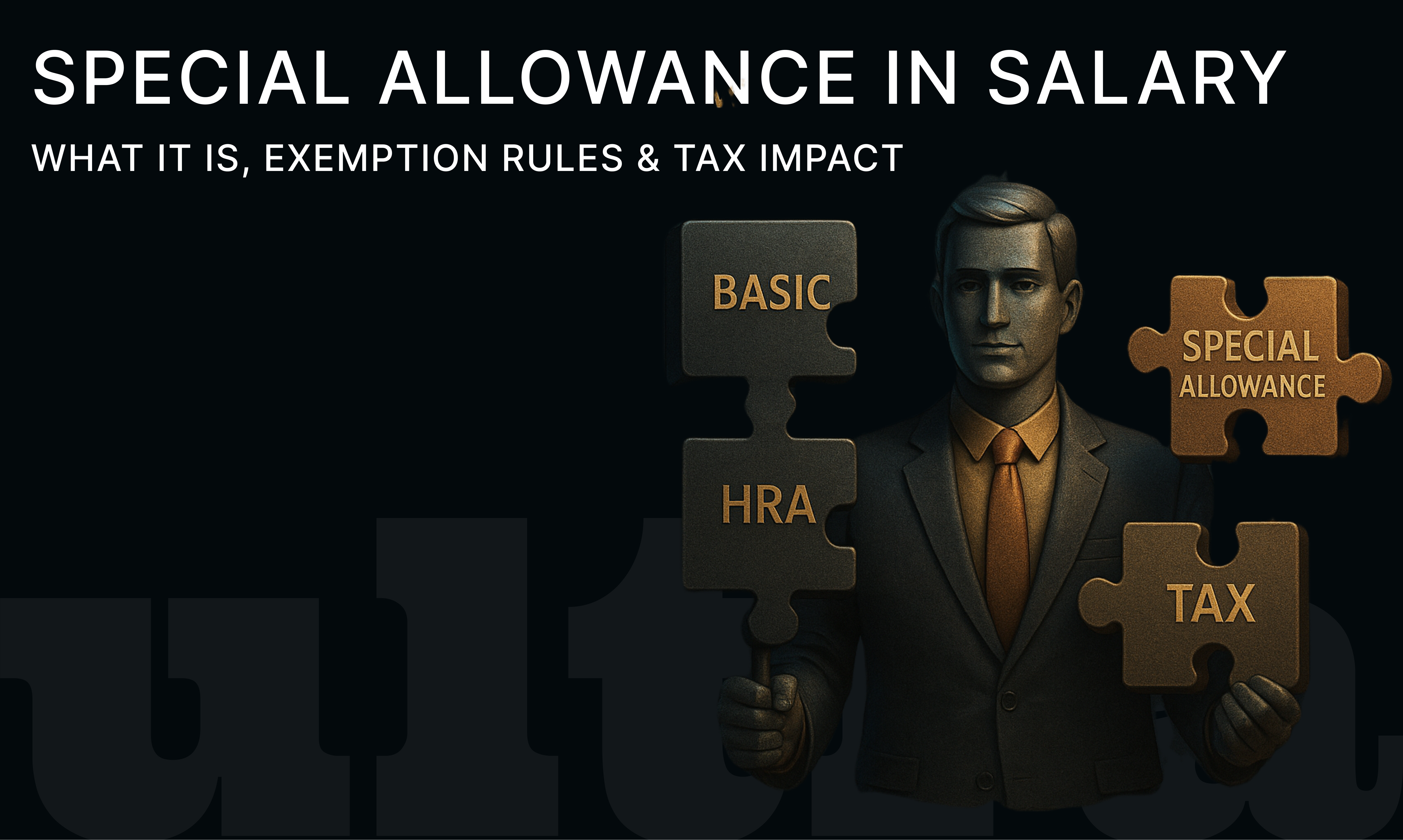Special Allowance in Salary: What It Is, Exemption Rules & Tax Impact
09 July 2025 · Sachin
Meaning, Taxability, Exemption, and Calculation of Special Allowance in India.

What is Special Allowance in Salary?
In India, your salary isn’t just your basic pay. It includes multiple elements like HRA, bonus, and often a flexible head called special allowance. But what does special allowance mean, how does it impact your taxable income, and can you plan for tax savings?
At Ultra, we make your salary and taxes simpler to understand so you can grow your wealth wisely. Here’s everything you need to know about special allowance.
A special allowance is an amount paid by an employer to an employee over and above basic salary to meet certain work-related or personal expenses, or simply to balance the Cost To Company (CTC).
Unlike allowances like House Rent Allowance (HRA) or Leave Travel Allowance (LTA), which have specific conditions and partial tax exemptions, special allowance is mostly unrestricted — it doesn’t need to be spent on anything specific.
Why Do Companies Pay Special Allowance?
Employers use special allowance for:
Adjusting net pay flexibly within CTC.
Rewarding employees for their skills, roles, or responsibilities.
Paying variable components like performance-based bonuses.
Is Special Allowance Taxable?
Here’s the crucial point — special allowance is fully taxable under the Income Tax Act unless specifically exempted under Section 10(14) for specific work-related allowances.
If you want to better understand how tax planning works for salary components like this, you should read our guide on Personal Tax Planning Strategies.
Special Allowance Exemption Rules
By default, the generic special allowance in your salary slip is fully taxable. However, some special allowances listed under Rule 2BB — like uniform allowance, children’s education allowance, or travelling allowance — qualify for partial exemption.
So, check your payslip to see if your special allowance is general or linked to any specific exemption.
Special Allowance Percentage in Salary
There is no standard percentage for special allowance. Companies usually fix it at 10%–40% of gross pay, depending on how they structure other heads like basic pay, HRA, bonus, and PF.
For example, if your CTC is ₹12 lakh, once the fixed parts are assigned, the leftover often becomes the special allowance.
How to Calculate Special Allowance in Salary
It’s simple:
Special Allowance = Total CTC – (Basic Pay + HRA + PF + Other Fixed Allowances)
There’s no fixed government rule on how much must be allocated — it depends on your company’s salary policy.
Examples of Special Allowance
Monthly performance bonus clubbed under special allowance.
Duty-based allowance for staff working in remote locations.
Research allowance for academicians.
Uniform allowance for certain sectors (partially exempt).
Is Special Allowance Tax-Free?
No. It’s generally taxable. Many employees assume it’s like HRA or LTA — but unless specifically defined and documented, it’s fully taxable as per your income tax slab.
If you want to know more about tax-saving options, read our guide on the Difference Between Tax Planning and Tax Evasion — it helps you structure salary components legally and smartly.
Special Allowance vs Direct & Indirect Tax
Special allowance is an income tax component — which means it’s a direct tax. If you’re confused about how direct taxes like income tax differ from indirect taxes like GST, read our detailed explainer on Direct and Indirect Tax Differences in India.
How to Optimize Special Allowance for Tax Savings
Talk to HR: See if parts of your special allowance can be converted to tax-exempt reimbursements like telephone or internet allowance.
Invest smartly: Use the extra taxable income to invest in tax-saving options like ELSS, NPS, or fixed income products on Ultra.
Keep records: Make sure you declare it properly in your tax returns to avoid surprises during filing.
Key Points to Remember
Special allowance is mostly taxable.
It balances your net pay in CTC.
You can’t claim generic exemptions unless it qualifies under Section 10(14).
Planning your salary structure with other allowances can reduce your taxable income.
Ultra Tip: Tax-Smart Investing
At Ultra, we help you grow your wealth and plan your taxes better. Use your salary wisely — invest the taxable part of your special allowance in safe, fixed-income opportunities, or diversify with short-term and long-term plans.
FAQs on Special Allowance
1. What is special allowance in salary?
A flexible payment over and above basic pay to adjust total salary.
2. Is special allowance taxable?
Yes, it is fully taxable unless covered under specific exemptions.
3. What is the typical percentage of special allowance?
Usually 10%–40% of gross pay, but it varies by company.
4. Can I claim special allowance exemption?
Only if your allowance qualifies under specific categories like uniform or research allowance.
5. Is special allowance part of direct tax or indirect tax?
It’s part of direct tax because it’s taxed as part of your personal income.
Final Thoughts
Understanding your salary structure helps you plan your taxes wisely. Special allowance is one of the most flexible but often misunderstood parts.
Want to learn how to plan it better?
Check our related reads:
Difference Between Tax Planning and Tax Evasion
Personal Tax Planning Strategies
Direct and Indirect Tax Differences in India
Stay informed, plan smartly, and let Ultra help you make the most of your money.